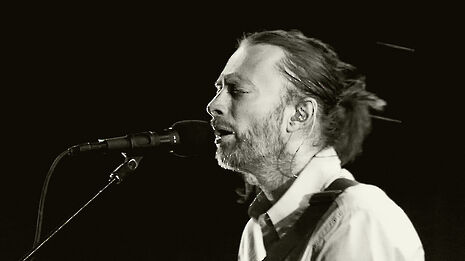Album: Radiohead – A Moon Shaped Pool
This is an album of intense and melancholic beauty.

For many, 2011’s The King of Limbs was an underwhelming affair. After the triumphant In Rainbows, Radiohead fans were left disappointed at having waited four years for only eight new tracks and an album too sampled, repetitive and electronic to make the wait worthwhile. The wait has been even longer this time around, but, happily, A Moon Shaped Pool does not disappoint.
Like those on The King of Limbs, these new songs are linear in structure. Each is carried to its conclusion by a continuous beat or idea that runs throughout. However, where The King of Limbs failed, A Moon Shaped Pool succeeds, managing to keep each song’s sole motif interesting and engaging. In this regard, ‘Burn the Witch’ – the album’s first single and opening track – sets the standard for the rest of the album. The staccato string arrangement that forms the song’s backbone, though repetitive, maintains a drama and a tension throughout thanks to its gradual intensification and to the dissonant guitars and strings which are steadily added, crescendoing the song to its cacophonous finale. It is this kind of layering and modification that distinguishes A Moon Shaped Pool. ‘Burn the Witch’ also foregrounds Thom Yorke’s voice, bringing it a prominence and a clarity so often missing on The King of Limbs. The song calls on us to “abandon all reason”, “shoot the messengers” and “burn the witch” in a parody of the powers-that-be. So eerie is Yorke’s delivery, though, that these commands do not seem parodic in the slightest, but rather frighteningly realistic.
These concerns with autocracy and suppression recur throughout the album, most obviously in ‘The Numbers’, in which Yorke incites ‘the people’ to take power into their own hands, do something about climate change and fight the governments and corporations that control us. The theme may not be particularly original or new for Radiohead, but Yorke’s claim that “we are of the earth” is reflected in the music, which is generally far more organic and bespoke on this album than on the last. ‘The Numbers’ could well be described as folk rock. Certainly, the song’s laid back acoustic guitars, tasteful keys and soulful backing vocals have a Neil Young quality to them. ‘Present Tense’ is equally understated, and there is even a jazz flavour, reminiscent of John Martyn, to ‘Desert Island Disk’.
‘Daydreaming’ is definitely a standout. Yorke’s voice is both beautiful and fragile as it drifts over the top of a piano’s spectral arpeggios. The end of the track sees the vocals reversed and distorted, which, if restored, would appear to say ‘I’ve found my love’. The very inversion of this pure and serene sentiment undercuts its meaning, and it is this duality of beauty and pain which is the central tension that underlies the album.
‘True Love Waits’ ends A Moon Shaped Pool in a similar vein. Though a part of Radiohead’s live set since 1995, this recorded version has lost none of the power that has made it a fan favourite all these years. Its title sets up the listener for a romantic song, but what we get instead is a truly haunting tale of a failed relationship. The sombre pianos, together with Yorke’s plangent tones, make for a disquieting end to this album of intense and melancholic beauty.
Listeners might be put off by just how quiet and subdued A Moon Shaped Pool is. Granted, the album might lack the stridence of The Bends and the focus of In Rainbows, but this is deliberate and not to its detriment. With each listen, new textures present themselves to the ear, new lyrics are discerned and deciphered and a new appreciation for this sonic canvass that has been painted emerges. A Moon Shaped Pool proves, then, that Radiohead are just as vital and as innovative now as they have ever been.
 News / Colleges charge different rents for the same Castle Street accommodation2 March 2026
News / Colleges charge different rents for the same Castle Street accommodation2 March 2026 News / News in Brief: waterworks, wine woes, and workplace wins 1 March 2026
News / News in Brief: waterworks, wine woes, and workplace wins 1 March 2026 News / Climate activists protest for ‘ethical careers policy’1 March 2026
News / Climate activists protest for ‘ethical careers policy’1 March 2026 News / Angela Merkel among Cambridge honorary degree nominees27 February 2026
News / Angela Merkel among Cambridge honorary degree nominees27 February 2026 News / Private school teacher who lied about Cambridge degree barred from teaching27 February 2026
News / Private school teacher who lied about Cambridge degree barred from teaching27 February 2026








